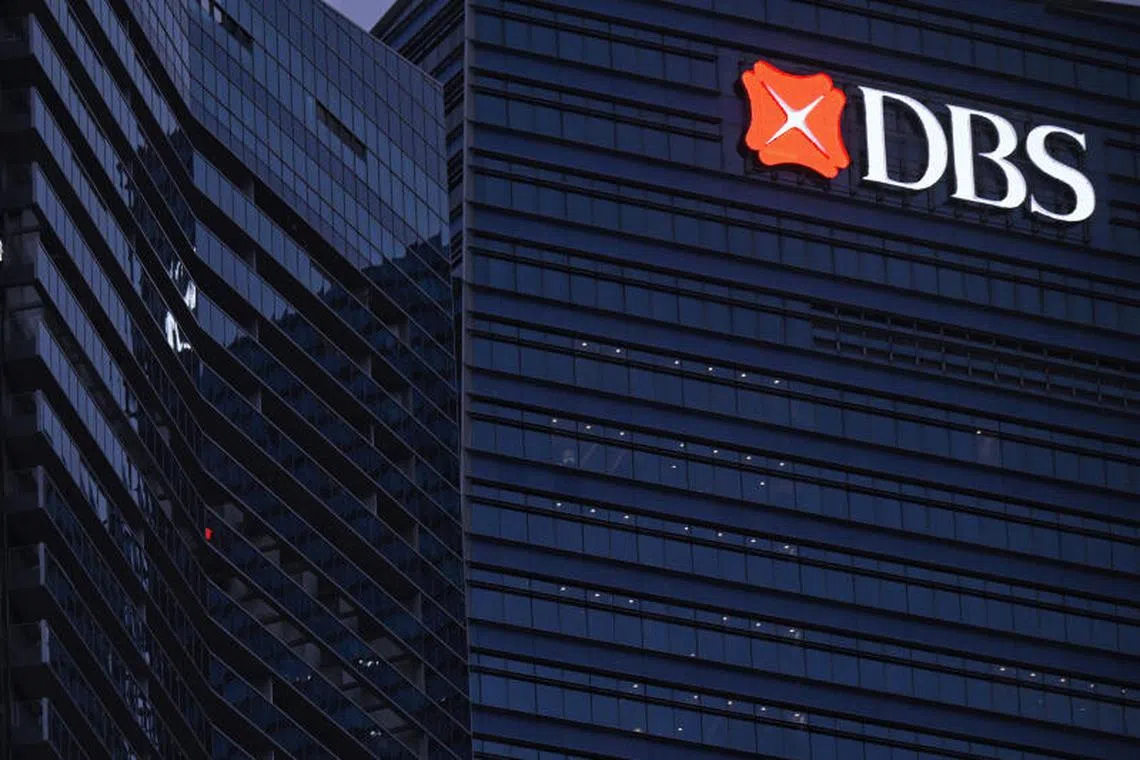DBS flags slowing growth in housing loans after record Q4 profit, but says overall momentum still strong
Sign up now: Get ST's newsletters delivered to your inbox

DBS declared a final dividend of 42 cents a share and a special dividend of 50 cents a share.
ST PHOTO: MARK CHEONG
Follow topic:
SINGAPORE – DBS Group Holdings’ chief executive Piyush Gupta flagged slowing growth in housing loans and some corporate loans, but said that the overall underlying momentum remains strong and the bank will continue to benefit from high interest rates.
His comments came after Singapore’s and South-east Asia’s largest bank on Monday reported fourth-quarter earnings that soared to a new record and raised dividends, as higher rates continued to boost its income.
Net profit for the three months to December 2022 jumped 69 per cent to $2.34 billion from $1.39 billion a year ago.
It also blew past the $2.17 billion forecast by analysts in a Bloomberg poll.
Earnings for the full year surged by 20 per cent to $8.19 billion while fourth-quarter return on equity – a measure of how efficiently a company generates its profits – stood at 17.2 per cent. Both of these were also new records.
Its board has proposed a final dividend of 42 cents a share for the fourth quarter, up from 36 cents a year ago, and a special dividend of 50 cents a share. This brings the total payout for the full year to $2 a share.
Mr Gupta in a results briefing said United States rate hikes will moderate in 2023, but he does not expect any rate cuts in the year.
DBS maintained its guidance for mid-single-digit loan growth for 2023, and signalled that fee income is set to expand at a double-digit rate as China’s border reopening benefits the region.
“We expect confidence to return to markets in the coming year as interest rate increases ease and China reopens,” Mr Gupta said.
Still, he cautioned that there is a downside risk of five to seven basis points to the bank’s peak net interest margin guidance of 2.25 per cent because of outflows to Treasury bills, a stronger local currency and higher funding costs.
Mr Gupta noted headwinds in the bank’s mortgage book here amid rising interest rates and stricter criteria rolled out by the Government in September to assess borrowers’ ability to qualify for a loan.
These factors are likely to dampen growth in housing loans for the bank, which rose by $2.8 billion in 2022, said Mr Gupta. He expects growth to come in at $1.5 billion to $2 billion in 2023.
“It’s been broad-based, in the private as well as the HDB side,” he said, adding that it will take two to three quarters for the impact of the policy changes to be fully felt and before housing loan growth normalises.
Momentum also slowed as companies shifted their borrowing to cheaper financing options or paid off their loans amid higher interest rates. Wealth management customers reduced margin loans, while Chinese clients found it cheaper to borrow onshore.
“The good news is that the underlying non-trade loan growth momentum continues to be quite strong. We saw loan growth across multiple industries. TMT (the technology, media and telecom sector) was soft because the cycle was coming off. But property, energy and logistics were strong,” said Mr Gupta.
DBS’ fourth-quarter non-performing loan ratio stood at 1.1 per cent, improving from 1.3 per cent a year ago. Mr Gupta said the bank had sufficient general provision buffers to cushion “idiosyncratic risks”.
The bank’s commercial book’s fourth-quarter net interest income soared 74 per cent year on year to $3.4 billion, bolstered by higher interest rates.
Net interest margin – a key gauge of banks’ profitability – rose 1 percentage point to 2.61 per cent, while loans grew 4 per cent in constant currency terms.
Fourth-quarter net fee income fell 19 per cent from a year ago to $661 million due to lower wealth management and investment banking fees.
Other non-interest income rose 13 per cent from a year ago to $320 million from an increase in treasury customer sales.
Total treasury markets income improved 6 per cent from a low base a year ago to $204 million. The segment’s net interest income stood at $181 million a year ago, but it recorded a loss of $125 million this time. However, its non-interest income rose 12 per cent to $329 million.
The bank’s fourth-quarter earnings were up 5 per cent from the third quarter as higher net interest income and lower general allowances more than offset seasonally lower non-interest income.
Its results kick off earnings season for Singapore’s local lenders. UOB will report its earnings on Feb 23, and OCBC Bank on Feb 24.
DBS shares closed down 2 per cent at $35.32, while OCBC dropped 1 per cent to $13.02 and UOB fell 1.05 per cent to $30.23.


